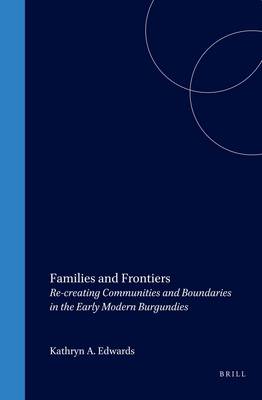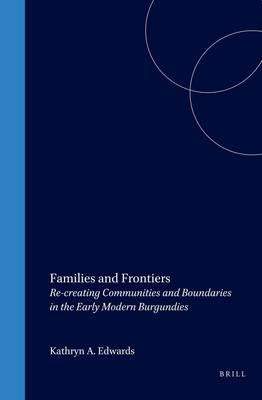
- Afhalen na 1 uur in een winkel met voorraad
- Gratis thuislevering in België vanaf € 30
- Ruim aanbod met 7 miljoen producten
- Afhalen na 1 uur in een winkel met voorraad
- Gratis thuislevering in België vanaf € 30
- Ruim aanbod met 7 miljoen producten
Zoeken
Families and Frontiers
Re-Creating Communities and Boundaries in the Early Modern Burgundies
Kathryn Edwards
€ 245,95
+ 491 punten
Omschrijving
The frontier of the Early Modern Burgundies? In this book, Edwards applies in reverse the American frontier concept in order to understand the local changes in family and community in a Burgundy torn in two after the death of Charles the Bold in 1477. During the late fifteenth and early sixteenth centuries, residents of the eastern duchy and the western county of Burgundy were in a place and time of transition and transformation, a veritable frontier. While France and the Holy Roman Empire vied for political control of the region, residents struggled to define their social, cultural, political, and economic relationships to each other. In the region of the Saône River valley, detailed case studies and family reconstruction of specific elites from the cities of Dijon, Dole, and Besançon are discussed. The river, ironically, acted as a roadway, not a barrier, and facilitated the fluidity of the residents' relationships. Thus, the Burgundian frontier was marked by a tacit acceptance of permeable boundaries and the ensuing choices, interchanges, negotiations, and flexibility inherent to the region. Edwards successfully argues that a frontier develops when a previously united region is divided and offers a provocative, alternative interpretation to contrast with the national historiography most frequently used by scholars. This book enhances our understanding of how pre-modern societies created regional identities.
Specificaties
Betrokkenen
- Auteur(s):
- Uitgeverij:
Inhoud
- Aantal bladzijden:
- 434
- Taal:
- Engels
- Reeks:
- Reeksnummer:
- nr. 26
Eigenschappen
- Productcode (EAN):
- 9780391041066
- Verschijningsdatum:
- 17/04/2002
- Uitvoering:
- Hardcover
- Formaat:
- Genaaid
- Afmetingen:
- 163 mm x 235 mm
- Gewicht:
- 789 g

Alleen bij Standaard Boekhandel
+ 491 punten op je klantenkaart van Standaard Boekhandel
Beoordelingen
We publiceren alleen reviews die voldoen aan de voorwaarden voor reviews. Bekijk onze voorwaarden voor reviews.











